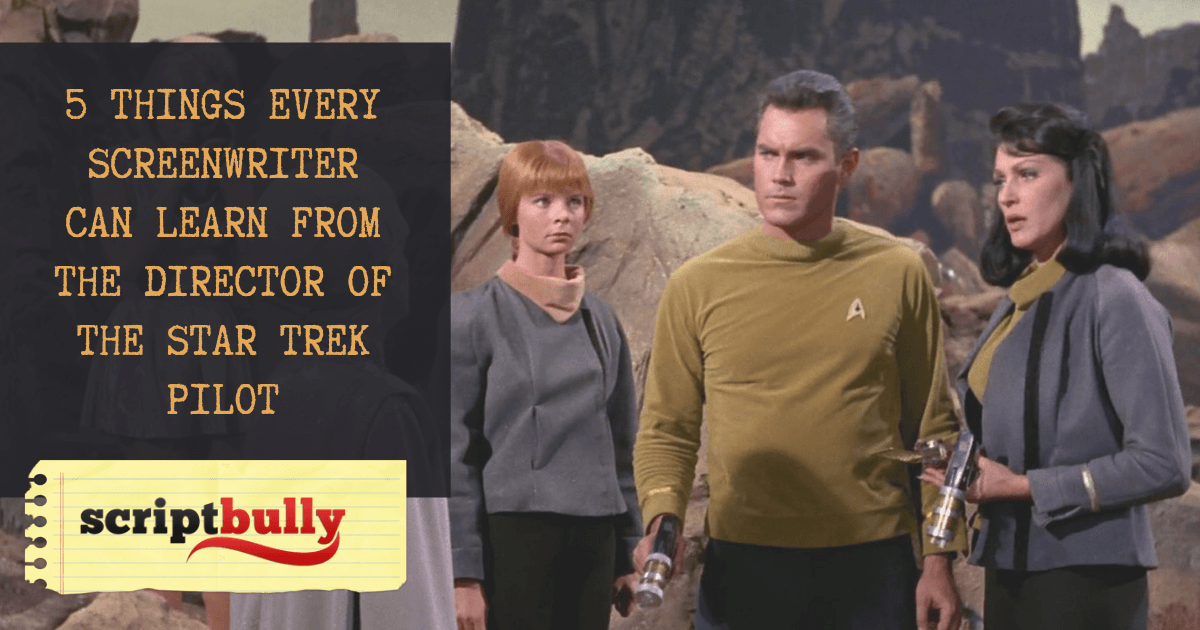A pilot sets the tone of a television show. And no director was better at setting the tone, and establishing a clear foundation for future episodes, than Robert Butler, the director of The Cage, the pilot episode of Star Trek.
Far from a one-trick pony, Butler has a varied and eclectic resume that includes work on Remington Steele, Columbo, and Gunsmoke, in addition to helming the pilots of Hill Street Blues and Batman. (Yes, the Adam West one.)
Though The Cage was later used in the two-part The Menagerie — and Leonard Nimoy was the only actor to make the transition from pilot cast member to series regular — many of the show’s classic elements, such as the bridge, transporter and Mr. Spock’s personality, were established under Butler’s direction.
We had a chance to catch Robert Butler in conversation with author and podcast host Larry Nemencek (Portal 47) during a panel at the Comic-Con International 2019. While he seems almost bemused by the fanfare that surrounds Star Trek – “I wasn’t interested then. I’m not interested now” – the 91-year-old is proud of the storytelling clarity he brought to the episode and delighted to see elements of his direction on display 55 years later.
Here are 5 things every screenwriter can learn from the quirky, wonderful — and often self-deprecating — mind of Robert Butler:
#1: You Don’t Have to Love the Material to Do the Material Justice
Butler was never a sci-fi fanboy.
He got the job to direct The Cage – not because of his love of starships and lasers – but because he had worked with Gene Roddenberry on The Lieutenant, and the show’s creator wanted him to help get this new production about “Wagon Train in Space” back on track.
But Butler thinks it was his lack of passion for the genre that gave him the fresh perspective needed to unearth a story filled with spaceships, transporters, and aliens with big heads.
“I didn’t want to do it at first. I read the script and I was skeptical. And a little disdainful. A little disdain is great. To fall in love with a script is not as good as having a little disdain. It gives you objectivity. Gene had put in every single Sci-fi trope he could. My job was to find the truth.”
#2-Don’t Worry About Stuff That’s Not the Story
There’s always politics involved in production.
- Will we stay within budget?
- Will we have enough for quality effects?
- Will we get a good time slot?
- Will the studio pull the plug because the showrunner ran off with the star’s wife? (Again)
Butler made it clear that during the production of The Cage he was only concerned with one thing: creating a well-told story.
“I’m trying to be straight and clear and effective with the audience as a director. That’s my job. The studio. The time slot. The price of color televisions. What the ship looks like. I don’t care about that stuff. I worry about the audience and the actors. Making the clearest, simplest line between the two. I don’t care about anything else. No creative should.”
#3-Always Go for Objective Over Emotion
Perhaps the contribution Butler is most proud – and the one that endures to this day – is the role he had in helping shape the personality of the impersonal Mr. Spock.
“Leonard paid me a great compliment. He said I told him: ‘Don’t be emotional. Don’t take sides. Be a scientist. Somebody dies? Oh, that’s interesting. Somebody got married. Oh, that’s fascinating.’ You can’t act an emotion. You can’t act ‘happy.’ You can act ‘scientist.’ You can play that. I think we were right on that one.”
#4-Sometimes the Subtler Choice is the Most Interesting
One of the more interesting moments during the panel was Butler expressing mild regret over one creative decision in particular. That was the performance of Majel Barrett who played “Number One.”
“Looking back on it I think I would have had her simplify the performance. She was ready to be the strong woman. Her professionalism was a little strong. It was like ‘You should listen to me because I’m a strong woman. So, I’m going to indicate my strength.” Strength was what the script said, what the scene called for. But what if she just played a woman? That might have been more interesting. Just a woman. People will listen to what I have to say. I deserve the job. The softer, subtler choice, that might have been the better choice.”
#5: Even the Greats Miss
Butler admits that the thing he tried to assert most influence on during production,was the thing he was the most misguided about.
The title.
“I tried to change the title. Star Trek. Seems heavy. I said to Gene: ‘Why not Star Track? You can see the lines, the fields, the geography of a Star Track.’ I tried to convince Gene. Not only did he not agree with me. He didn’t even hear me. Good thing. 55 years later he might have been right.”






